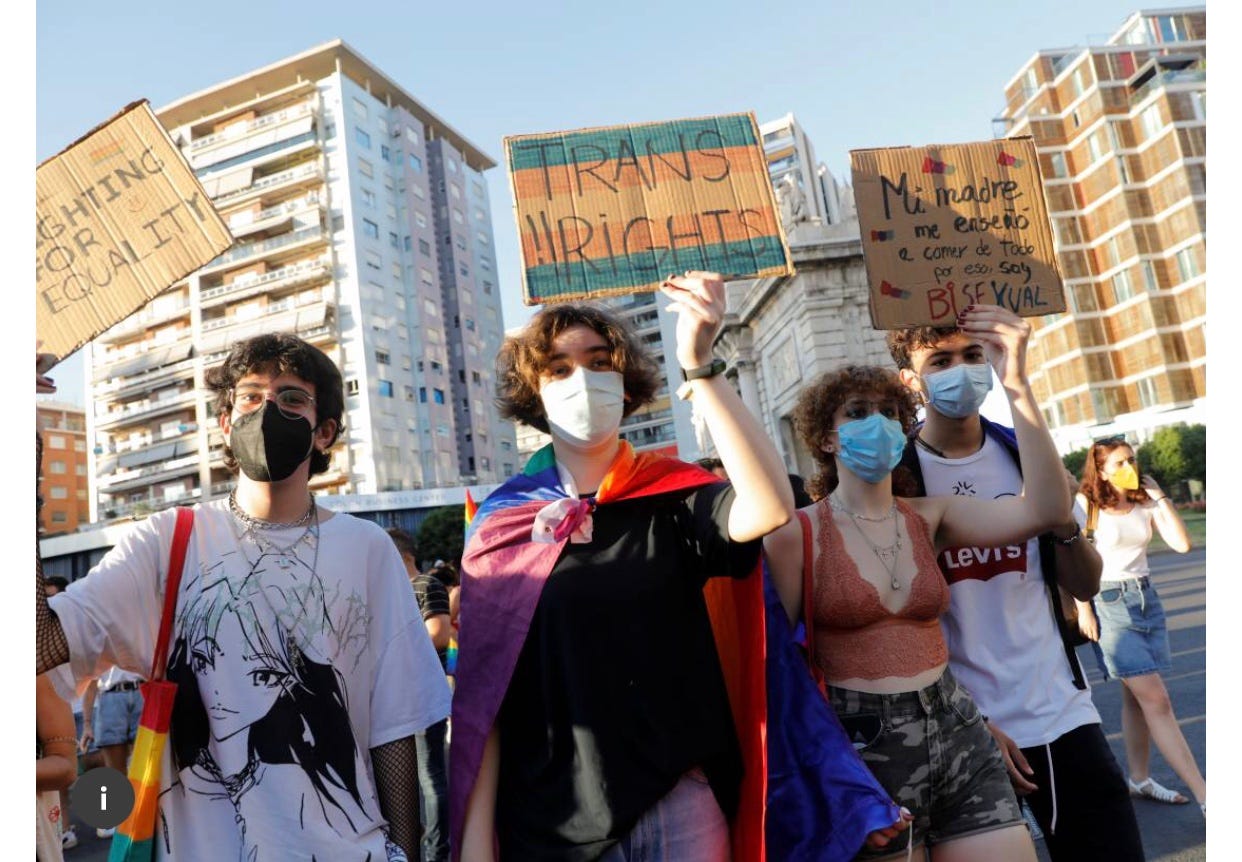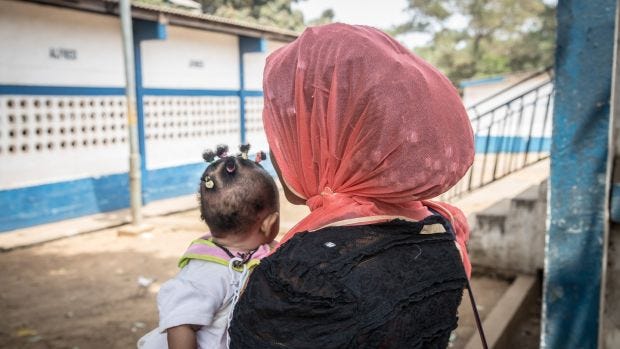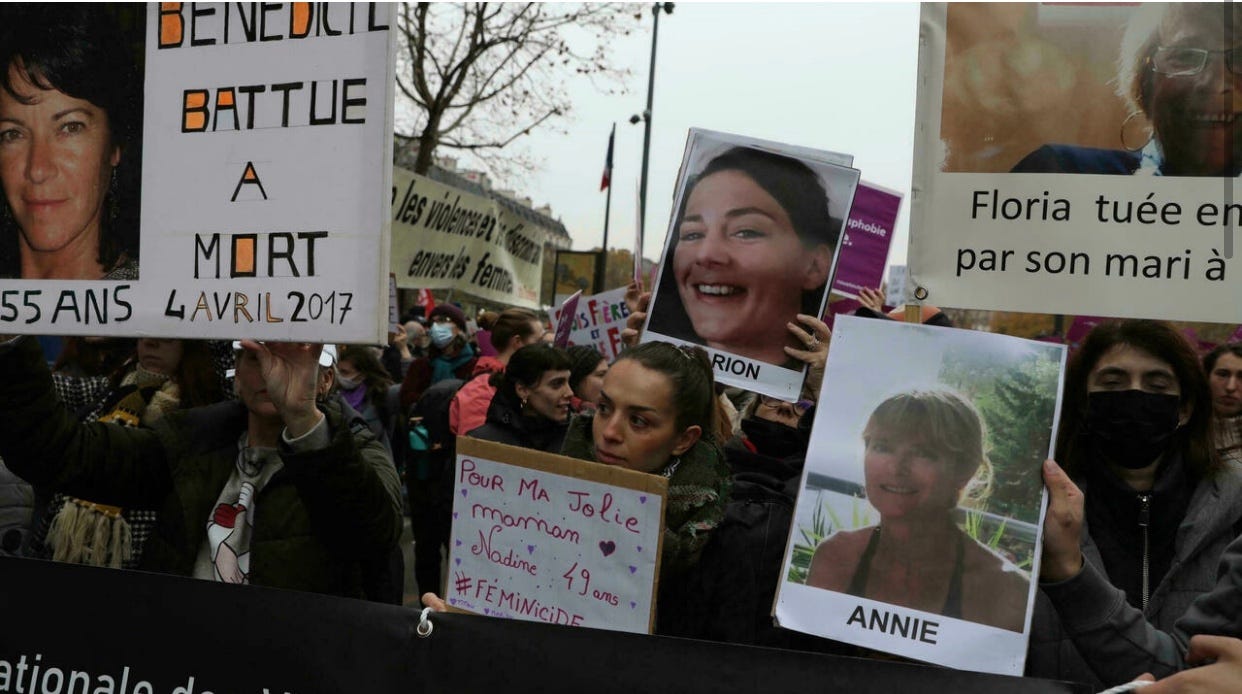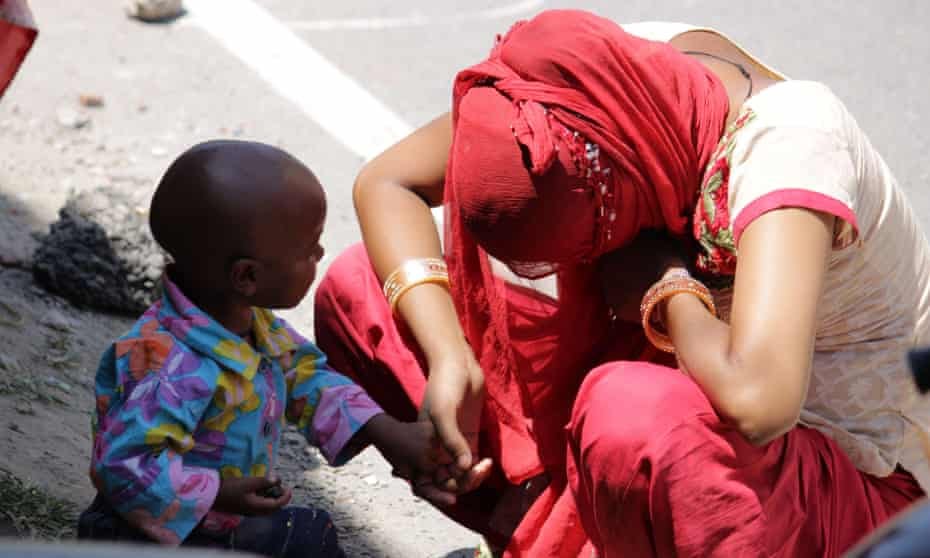Global Roundup: Spain IVF Equality for LGBT+ People, Sierra Leone Migrants Exploited & Abused, Violence vs Women in France, COVID-19 Worsens Postnatal Depression, Animated Short Film on Masturbation
Compiled by Samiha Hossain
A groundbreaking new Spanish government order has granted equal rights to state-funded in-vitro fertilisation (IVF) to lesbians, and transgender and non-binary people. Activists have praised the move, which may push other countries to follow suit and ease access to IVF.
Though same-sex marriages or civil unions are legal in about 30 European countries, legislation regarding LGBT+ people having children is inconsistent. Across Europe, 21 countries let one member of a same-sex couple adopt a partner's child, 18 permit joint adoption and 16 give lesbian couples access to fertility treatments involving donated sperm, according to an estimate based on data from LGBT+ rights group ILGA-Europe.
What Spain has done is unique, (by encoding an) anti-discrimination principle into its assisted reproduction technology service package...When one country makes a change, others take note ... We hope to see this model put forth as a good practice so that other countries can learn and follow suit. - Cianan Russell, a senior policy officer at ILGA-Europe.
Explicit protection against discrimination is essential. For instance, Germany neither prohibits or allows trans people from undergoing fertility treatment, but many lesbians and trans people find themselves at the mercy of individual fertility clinics' policy on patients.
Even with legislation in place, public funding can also be a challenge. A German federal court ruled recently that a lesbian couple did not have the right to have their fertility treatment covered by their public health insurance, arguing that donated sperm was not included in the scheme.
That means many are rejected due to prejudice or ignorance, they said.
It's all based on very old stereotypes that people still have in their heads: that straight couples should have kids and therefore get help for that, and queer people shouldn't. - Noah Triller, a trans man based in Berlin.
This unique legal change in Spain will be important in fighting outdated cis heteronormative notions of family. Other countries must do more to ensure fertility treatment is accessible for the LGBT+ community.
Mariatu, pictured with the baby she gave birth to upon returning to Sierra Leone from Kuwait. Photograph: Sally Hayden via Irish Times
CW: Sexual violence
In 2018, Mariatu (not her real name) travelled to Kuwait with a group of women to seek employment, as she needed money to resume her studies. There, she was forced to work as a domestic worker for 18 months without pay. For the first year, she was prohibited from contacting her family. Then she was raped by the man who owned the house. Afterwards, he reported her to the police, accusing her of stealing. She was imprisoned for three months, before being deported to Sierra Leone. She returned during the pandemic in 2020 and was pregnant.
Earlier this year, Sierra Leone’s government lifted a two-year ban on labour migration and overseas job recruitment, which was instituted because of the systemic exploitation and abuse of Sierra Leoneans who travelled abroad for work, particularly to the Middle East.
The long-criticized kafala system common in the Middle East, binds foreign workers to an employer, leaving them without labour rights or the ability to escape an abusive situation. Sheku Bangura, the director and founder of the Advocacy Network Against Irregular Migration, said his organisation is in touch with 800 women who recently returned from the Middle East, many of whom suffer from a variety of medical issues.
They have a lot of problems. Some of them...were used as sex workers, others were used as slaves and worked without payment, some went to prisons, some tortured, some raped. They come back with fatherless babies. Most of them want to start a business. Some are traders, they used to do business here and used that money to travel. Some of them want to go back to school and learn a skill. - Sheku Bangur
Bangur is trying to work with the police to pursue convictions, but success is unlikely. The country’s first human trafficking convictions happened only in 2020, according to the International Organisation for Migration. Since then, 30 people were prosecuted and one convicted. Traffickers in Sierra Leone have been known to pay off victims’ families or bribe prosecutors to stop cases progressing.
All my life is miserable. I achieved nothing. There is no job for us, nothing good for us. We really need help, we are so hopeless in this country. If I have a way to get justice it will be right but I don’t think it’s possible. - Fatima, former migrant
The horrific treatment of these migrant women from Sierra Leone cannot be ignored. The kafala system must be abolished. In addition, countries must do more to prevent trafficking and pursue justice for victims.
Demonstrators denouncing violence against women hold portraits of femicide victims during in Paris on 20 November 2021. © Adrienne Surprenant/AP via France24
The new measures include the opening of 1,000 shelter spaces for victims in 2022 and maintaining the same level of financing to combat violence. Also, 5,000 “serious danger” telephones, equipped with a button to contact authorities directly, will be distributed in 2022. The Prime minister says the phones have proven to be effective in protecting victims from their abuser. There will also be a “week of equality between girls and boys” at schools, to be held during the week of March 8 from next year.
Activists have been criticizing France for a long time for its lack of investment in women’s safety. They say a tripling of investment is needed to make an effect. Last week, tens of thousands of protesters took to the streets across the country to demand more government action to prevent violence against women. Protesters marched in the capital behind a large banner saying, “Stop sexist and sexual violence.”
There are measures that have been put into effect like the telephone for those in serious danger”, a special phone with a button to push to alert police...But there aren’t enough for everyone. Measures half done, men who are detained temporarily or even imprisoned but are eventually released without any measures that follow … that’s the problem. - Meryll Le Goff, demonstrator
Police in France responded to 159,400 domestic violence cases in 2020, an increase of 10% from 2019. The national hotline saw a 114 % increase in calls between 2017 and 2020, according to the National Women’s Solidarity Federation. At least 101 women have been killed by their partners or former partners in France this year and over 220,000 women are suffering physical or sexual abuse by their partners each year, according to a 2017 nationwide study.
Though some action has been taken, it is important that the government continue to listen to activists in France who are demanding more funding and long term strategies that address the root causes of violence against women.
A mother with her child in Uttarakhand. Nearly half of women who phoned a helpline during the pandemic had symptoms of postpartum psychosis. Photograph: Devendra Rawat/Alamy
When 26-year-old Divya tried to suffocate her new daughter with a pillow, she sought help from women’s organisations and the women’s police station in her town. However, she was told that the safest place for a child was with her mother. Divya suffered from postpartum psychosis – a severe mental health condition characterised by difficulty in responding emotionally to a newborn. Her condition worsened without the proper support, leading her to kill her baby. She was arrested and sent to a mental health institution for 42 days and is now living with her father and undergoing psychiatric treatment.
An estimated 1 in 7 women can develop some form of postpartum depression (PPD), but in India, the figure is closer to 1 in 5. Many women have to deal with it alone due to stigma surrounding mental health and a shortage of professional psychological support.
The COVID-19 pandemic has only exacerbated this problem, as expecting individuals have to isolate themselves. There are also long waitlists for counselling. The mental health workforce is severely understaffed, with an estimate in 2019 suggesting India needs another 27,000 psychiatrists for its population. About 46% of women who phoned a Nimhans helpline during the pandemic were exhibiting symptoms of postpartum psychosis.
The need is “overwhelming in the entire country...We have been asking the government to mainstream perinatal mental health for a long time, even before the pandemic. Sadly, it hasn’t happened. - Dr Prabha S Chandra, head of perinatal psychiatry at the National Institute of Mental Health and Neurosciences (Nimhans) in Bengaluru
It is heartbreaking that so many people expecting or with new children have to suffer alone and in silence. It is crucial that destigmatizing mental health includes postnatal depression.
FILMMAKER OLIVIA GRISELDA EXPLORES MASTURBATION IN THE ANIMATED SHORT FILM SHE AND HER GOOD VIBRATIONS. IMAGE: COURTESYOF OLIVIA GRISELDA via VICE
Griselda was worried she was using the vibrator too much - she even had a bizarre dream where her fallopian tube fell out while she was using the vibrator daily. The vibrator broke down just after one month of heavy usage. In Asia, the idea of women masturbating and sex toys remain taboo. Sex toys like vibrators are often seen as instruments reserved for “deviants,” rather than tools of self-discovery.
It took me a while to share this story with my close friends because I didn’t want to be judged as sexually promiscuous. - Olivia Griselda
A few years later, Griselda read a story she wrote based on her experience at a story showcase at a local acting school. She received positive reactions and the women found it very funny – many even said they were too embarrassed to talk about vibrators with their friends. Griselda realized she wanted to take her story further, so she took it to Animated Visions: Story Development Lab, a workshop organized by Cartoons Underground—an annual animated film festival that celebrates animation from Southeast Asia—and non-profit organization SCAPE. She won the Best Pitch Award and met her co-director and producer for her first animated short film She and Her Good Vibrations. The film will “spark conversations around sex positivity and break down prejudices around female self-pleasure.”
She and Her Good Vibrations, to be released in 2022, is inspired by Griselda's real-life experience and will tell the story of a middle-aged woman who receives a mysterious box containing—surprise—a vibrator. With increasingly frequent usage, she eventually loses touch with reality, vividly told in surreal illustrations.
Animation is able to create a certain kind of a safe distance between the audience and the film. While people could get uncomfortable watching intimate scenes played by actors, they might feel more at ease laughing along with animated characters. - Olivia Griselda
Patriarchy tells women to be ashamed about masturbation and sex toys and as such women’s pleasure is often negelcted. Griselda is using comedy and filmmaking to challenge those patriarchal norms and encourage women to embrace their pleasure.
Samiha Hossain (she/her) is a student at the University of Ottawa. She has experience working with survivors of sexual violence in her community, as well as conducting research on gender-based violence. A lot of her time is spent learning about and critically engaging with intersectional feminism, transformative justice and disability justice.
Samiha firmly believes in the power of connecting with people and listening to their stories to create solidarity and heal as a community. She refuses to let anyone thwart her imagination when it comes to envisioning a radically different future full of care webs, nurturance and collective liberation.






